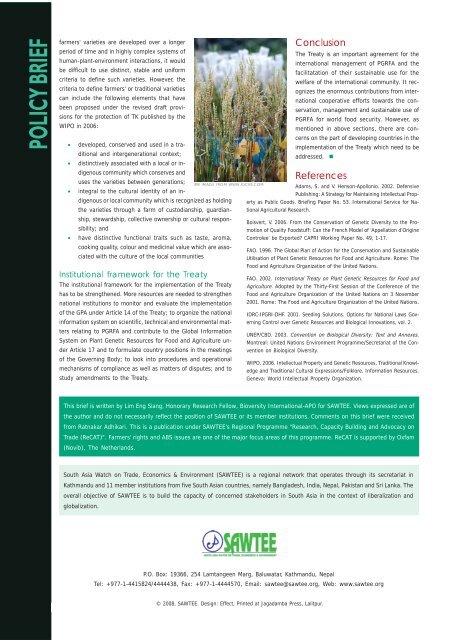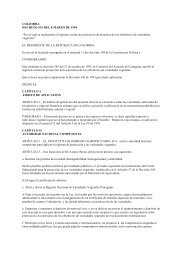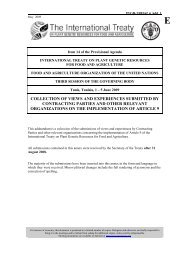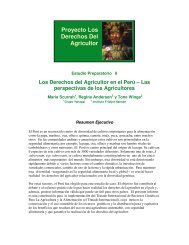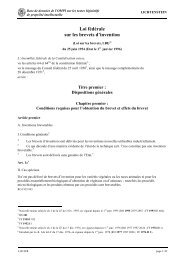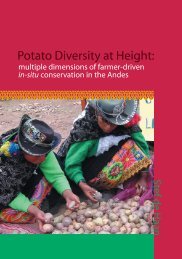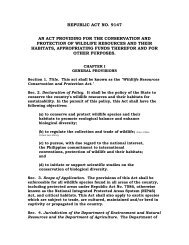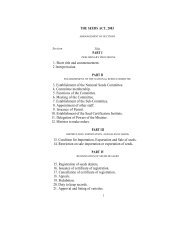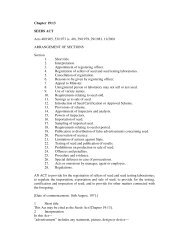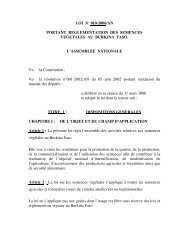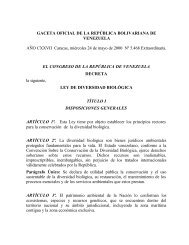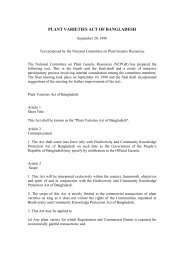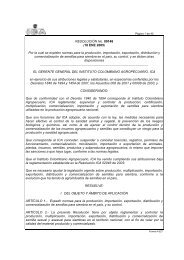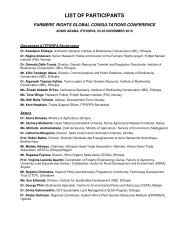itpgrfa - Farmers' Rights website
itpgrfa - Farmers' Rights website
itpgrfa - Farmers' Rights website
Create successful ePaper yourself
Turn your PDF publications into a flip-book with our unique Google optimized e-Paper software.
8POLICY BRIEFfarmers' varieties are developed over a longerperiod of time and in highly complex systems ofhuman-plant-environment interactions, it wouldbe difficult to use distinct, stable and uniformcriteria to define such varieties. However, thecriteria to define farmers' or traditional varietiescan include the following elements that havebeen proposed under the revised draft provisionsfor the protection of TK published by theWIPO in 2006:• developed, conserved and used in a traditionaland intergenerational context;• distinctively associated with a local or indigenouscommunity which conserves anduses the varieties between generations;• integral to the cultural identity of an indigenousor local community which is recognized as holdingthe varieties through a farm of custodianship, guardianship,stewardship, collective ownership or cultural responsibility;and• have distinctive functional traits such as taste, aroma,cooking quality, colour and medicinal value which are associatedwith the culture of the local communitiesInstitutional framework for the TreatyThe institutional framework for the implementation of the Treatyhas to be strengthened. More resources are needed to strengthennational institutions to monitor and evaluate the implementationof the GPA under Article 14 of the Treaty; to organize the nationalinformation system on scientific, technical and environmental mattersrelating to PGRFA and contribute to the Global InformationSystem on Plant Genetic Resources for Food and Agriculture underArticle 17 and to formulate country positions in the meetingsof the Governing Body; to look into procedures and operationalmechanisms of compliance as well as matters of disputes; and tostudy amendments to the Treaty.ConclusionThe Treaty is an important agreement for theinternational management of PGRFA and thefacilitatation of their sustainable use for thewelfare of the international community. It recognizesthe enormous contributions from internationalcooperative efforts towards the conservation,management and sustainable use ofPGRFA for world food security. However, asmentioned in above sections, there are concernson the part of developing countries in theimplementation of the Treaty which need to beaddressed. •ReferencesIRRI IMAGE FROM WWW.FLICKR.COMAdams, S. and V. Henson-Apollonio. 2002. DefensivePublishing: A Strategy for Maintaining Intellectual Propertyas Public Goods. Briefing Paper No. 53. International Service for NationalAgricultural Research.Boisvert, V. 2006. From the Conservation of Genetic Diversity to the Promotionof Quality Foodstuff: Can the French Model of ‘Appellation d’OrigineControlee’ be Exported? CAPRI Working Paper No. 49, 1-17.FAO. 1996. The Global Plan of Action for the Conservation and SustainableUtilisation of Plant Genetic Resources for Food and Agriculture. Rome: TheFood and Agriculture Organization of the United Nations.FAO. 2002. International Treaty on Plant Genetic Resources for Food andAgriculture. Adopted by the Thirty-First Session of the Conference of theFood and Agriculture Organization of the United Nations on 3 November2001. Rome: The Food and Agriculture Organization of the United Nations.IDRC-IPGRI-DHF. 2001. Seeding Solutions. Options for National Laws GoverningControl over Genetic Resources and Biological Innovations, vol. 2.UNEP/CBD. 2003. Convention on Biological Diversity: Text and Annexes.Montreal: United Nations Environment Programme/Secretariat of the Conventionon Biological Diversity.WIPO. 2006. Intellectual Property and Genetic Resources, Traditional Knowledgeand Traditional Cultural Expressions/Folklore. Information Resources.Geneva: World Intellectual Property Organization.This brief is written by Lim Eng Siang, Honorary Research Fellow, Bioversity International-APO for SAWTEE. Views expressed are ofthe author and do not necessarily reflect the position of SAWTEE or its member institutions. Comments on this brief were receivedfrom Ratnakar Adhikari. This is a publication under SAWTEE's Regional Programme "Research, Capacity Building and Advocacy onTrade (ReCAT)". <strong>Farmers'</strong> rights and ABS issues are one of the major focus areas of this programme. ReCAT is supported by Oxfam(Novib), The Netherlands.South Asia Watch on Trade, Economics & Environment (SAWTEE) is a regional network that operates through its secretariat inKathmandu and 11 member institutions from five South Asian countries, namely Bangladesh, India, Nepal, Pakistan and Sri Lanka. Theoverall objective of SAWTEE is to build the capacity of concerned stakeholders in South Asia in the context of liberalization andglobalization.P.O. Box: 19366, 254 Lamtangeen Marg, Baluwatar, Kathmandu, NepalTel: +977-1-4415824/4444438, Fax: +977-1-4444570, Email: sawtee@sawtee.org, Web: www.sawtee.org© 2008, SAWTEE. Design: Effect, Printed at Jagadamba Press, Lalitpur.


